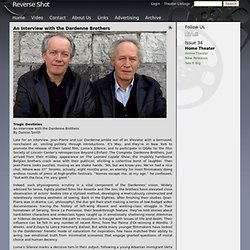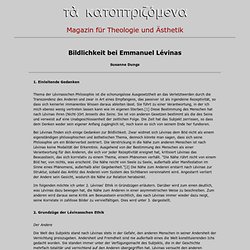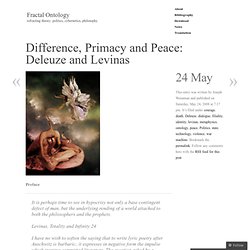

An Interview with the Dardenne Brothers. Tragic Destinies An Interview with the Dardenne Brothers By Damon Smith Late for an interview, Jean-Pierre and Luc Dardenne amble out of an elevator with a bemused, nonchalant air, smiling politely through introductions.

It’s May, and they’re in New York to promote the release of their latest film, Lorna’s Silence, and to participate in Q&As for the Film Society of Lincoln Center’s retrospective Beyond L’Enfant: The Complete Dardenne Brothers. Just arrived from their midday appearance on The Leonard Lopate Show, the impishly handsome Belgian brothers crack wise with their publicist, eliciting a collective burst of laughter. Then Jean-Pierre looks puzzled, musing as we shake hands, “Ah, but we know you. We’ve had a nice chat. Indeed, such physiognomic scrutiny is a vital component of the Dardennes’ vision. Reverse Shot: Characters in your narrative features often face crises of conscience. Luc Dardenne: Yes. RS: There’s often an atmosphere of distress in your narrative films. LD: Yeah. Die akademische Kultur befreien - Judith Butler "Kritik Dissens Disziplinarität"
Judith Butler: "Kritik Dissens Disziplinarität" Von Klaus Englert In "Kritik Dissens Disziplinarität" verteidigt Butler die akademische Freiheit.

(AP) Für den Widerstreit, gegen institutionelle Normen: Die kalifornische Philosophin Judith Butler stellt sich in die Tradition der Aufklärung. In ihrer Streitschrift plädiert sie für eine offene, schrankenlose Universität - und kritisiert einen ehemaligen US-Präsidenten. Judith Butler treibt eine Ethik um, der es nicht um Moralvorschriften geht. "Mir geht es um die Frage, inwieweit eine Ethik möglich ist, die für die Menschen wirklich lebensfähig ist, ihnen also keine Gewalt antut und in keiner Weise mit Gewaltausübung assoziiert werden kann.
" Judith Butler stieß sich damals am patriot act, den der amerikanische Präsident durchsetzte, um viele Bereiche des öffentlichen Lebens besser kontrollieren zu können. Butlers Thema ist zwar der Wissenschaftsbetrieb. "Was, wenn überhaupt, legitimiert solche Normen? " Magazin für Theologie und Ästhetik - Heft 25 - Susanne Dungs: Bildlichkeit bei Emmanuel Lévinas. 1.

Einleitende Gedanken Thema der Lévinasschen Philosophie ist die schonungslose Ausgesetztheit an das Verletztwerden durch die Transzendenz des Anderen und zwar in Art eines Empfangens, das passiver ist als irgendeine Rezeptivität, so dass sich keinerlei immanentes Wissen daraus ableiten lässt. Sie führt zu einer Verantwortung, in der ich mich ebenso wenig vertreten lassen kann wie im eigenen Sterben.[1] Diese Bestimmung des Menschen hat nach Lévinas ihren (Nicht-)Ort Jenseits des Seins. Sie ist von anderen Gesetzen bestimmt als die des Seins und verweist auf eine Unabgeschlossenheit der zeitlichen Folge. Die Zeit hat das Subjekt zerrissen, so dass dem Denken weder sein eigener Anfang zugänglich ist, noch kann es sich von seinem Ende her fundieren.
Bei Lévinas finden sich einige Gedanken zur Bildlichkeit. Im folgenden möchte ich unter 2. 2. Der Andere Die Welt des Subjekts stand nach Lévinas stets in der Gefahr, den anderen Menschen in seiner Andersheit der Vernichtung preiszugeben. 3. Difference, Primacy and Peace: Deleuze and Levinas « Fractal Ontology. Preface It is perhaps time to see in hypocrisy not only a base contingent defect of man, but the underlying rending of a world attached to both the philosophers and the prophets.Levinas, Totality and Infinity 24I have no wish to soften the saying that to write lyric poetry after Auschwitz is barbaric; it expresses in negative form the impulse which inspires committed literature.

The question asked by a character in Sartre’s play Morts Sans Sepulture, “Is there any meaning in life when men exist who beat people until the bones break in their body?’ Is also the question whether art now has a right to exist; whether intellectual regression is not inherent in the concept of committed literature because of the regression of society.Adorno, “Commitment”Doubtless, the present situation is highly discouraging.Deleuze and Guattari, A Thousand Plateaus 422 Our age has borne witness to the most rapid expansion of military and state power in human history. (more soon) Like this: Like Loading...